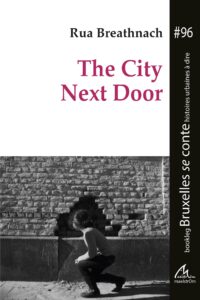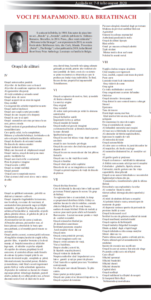Post in translation: The City Next Door
 Nota dell’autore
Nota dell’autore
Rua Breathnach 1
The City Next Door esplora una parte di Bruxelles poco rappresentata in letteratura: Molenbeek, quartiere proletario e di immigrati.
Rispecchiando la ricchezza linguistica della città, ognuna delle dieci sezioni del poema è tradotta in una lingua diversa: irlandese, neerlandese, brusseleir (dialetto di Bruxelles), turco, lingala, tedesco, italiano, rumeno, greco e francese. Le traduzioni sono pubblicate a fronte del testo originale.
Questa scelta poliglotta s’intreccia a uno dei temi pricipali del poema: il desiderio di scoprire una città più aperta dietro le barriere che separano persone, comunità e quartieri.

THE CITY NEXT DOOR
I
The city of incredible crumbling façades The shining new city
The same old dilapidated faces
The city that welcomes you into her arms Spurns you and spits you out
The indifferent city
The city that leaves nobody indifferent The city of tenements
Gated communities Bleak prospects Endless opportunities
The grey city where even a patch of grass is hard to find The city of canal boats
Piles of scrap metal, gravel, and sand The whirr of the cement grinder Grinding out cities
I
Cathair na n-aghaidheanna dochreidte is iad ag sceitheadh An chathair nua lonrach seo
Na seanphusanna scriosta céanna
An chathair a deir, ‘Chugam aniar thú!’
A dhiúltaíonn duit is a chaitheann amach as a béal thú
An chathair nach bhfuil éinne ar nós cuma liom ina taobh Cathair na dtionóntán
Na bpobal geataithe Droch-bhail ar chúrsaí
Féidearthachtaí gan áireamh
Cathair liath is an brobh féir ar a sheachaint inti Cathair na mbád canála
Dramh-mhiotal ina charn, gairbhéal, is gaineamh Seabhrán ón meascóir stroighne
agus cathracha á mbrú amach aige
[ irlandais : ROSENSTOCK Gabriel ]
*
IV
The city of parallel universes Coughing heat pipes Encrusted sewer pipes Noises inside the walls
Of life going on all around
The city smudged in a layer of dirt The city covered in a layer of rust The oxidizing city
The oxygen in our blood cells The layers of meaning
The city you can never sum up The city you could never leave The city where you ended up
Where men sit on terraces drinking tea and facing the street The internal city of housewives, semiliterate women Washing and ironing clothes, taking short trips to the shops,
Feeding and changing babies, pottering around blazing kitchens The city beyond one’s horizons
Beyond the reach of any one mind The city composed of minds
The minds trying to impose themselves on the city The vain city, the city that gets too big for its boots The city that risks becoming a caricature
Trapped inside the image of itself This is not that kind of city
The down-to-earth city The down-at-the-heel city
This is the city that surprises you constantly
Just when you thought there was nothing else to learn
IV
Paralel evrenlerin şehri Öksüren ısı borularının
Kabuk tutmuş lağım borularının kenti Duvarlar içindeki sesler
Dört tarafta süregelen hayatın sesi Bir kir tabakasında kirlenmiş şehir Bir pas tabakasıyla kaplanmış kent Oksitleyici şehir
Kan hücrelerimizdeki oksijen Anlamın katmanları işte
Asla özetleyemeyeceğin kent
Asla terk edemediğin Nihayete erdiğin şehir
Adamların teraslarda çay içerek oturduğu ve caddeye baktıkları
İç şehri ev hanımlarının, yarı eğitimli kadınların
Çamaşır yıkayan ve ütüleyen, dükkanlara çıkan kısa gezintiye Bebekleri doyurup altını değiştiren, uğraşan alevli mutfaklarda Ufuklarının ötesindeki kent
Her aklın uzağındaki Zihinlerden oluşan şehir
Kendilerini kente kabul ettirmeye çalışan zihinlerden Nafile şehir, kendini bir şey sanan şehir
Bir karikatüre dönüşme tehlikesine düşen şehir Kendi görüntüsünde kapana kısılan
Öyle bir şehir değildir ya bu Gerçekçi kent
Pejmürde şehir
Tam da başka öğrenecek bir şey yok diye düşündüğünde Bu şehirdir ikide bir seni şaşırtan
[ turc : YALÇINKAYA Ahmet ]
*
VII
The city outside the window:
Slices of watermelon on display in a crate on the pavement. First melon of the season. A group of men huddled around it on a hot day, the shop-owner dealing out slices. Buckets of olives drowned in olive oil, wrinkled Medjoul dates at 50 cents apiece, buzzing with flies. Toilet paper and nappies piled up under fluorescent lights. All the stuff necessary for a comfortable life with no frills.
The city where the planes fly low The thundering atmosphere
A panorama of the city
The city’s glowing embers seen from the sky The eternal city
The city as a wellhead of stories These stories imagined from above
Each one of the spoken streets containing Life and dreams and consciousness
The people of the city as actors The façades of the city as décor
The violent city just beneath the surface:
The night of the raids, packing a bag and being ready to leave If things get too hot. The neighbourhood cordoned off,
A helicopter hovering. Blackout. In the thick of it. Rubbish blowing down the empty streets.
The city that can turn on you The city as a point of tension
Running feet, hollow-sounding on the pavement The crowd of onlookers milling about Agonising
The men at the café muttering The ambulance paralysed in traffic The city of near misses
Horrific injuries
The man on the cherry picker whose arm is crushed The high-pitched yelping
The way your mind concentrates on that one sound And filters out the rest
VII
La città oltre la finestra:
Fette di anguria esposte in una cassetta sull’asfalto. La prima anguria della stagione. Un gruppo di uomini stretti intorno in una giornata calda, il negoziante distribuisce fette. Secchielli di olive affogate in olio d’oliva, grinzosi datteri Medjoul a cinquanta centesimi l’uno, ronzanti di mosche. Carta igienica e pannolini impilati sotto i neon. Tutto il necessario per una vita comoda e senza fronzoli.
La città dove gli aerei volano basso L’atmosfera tonante
Un panorama della città
I tizzoni ardenti della città visti dal cielo La città eterna
La città come fonte di storie Queste storie immaginate dall’alto
Ciascuna delle strade parlate racchiude Vita e sogni e coscienza
Gli abitanti della città come attori
Le facciate della città come scenografia
La città violenta appena sotto la superficie:
La notte delle retate, riempire una borsa ed esser pronti a scappare Se le cose buttano male. Il quartiere transennato,
Un elicottero in cielo. Oscuramento. Totalmente dentro. Rifiuti che volano lungo le strade vuote.
La città che può rivoltarsi contro
La città come punto di tensione
Passi di corsa risuonano sordi sull’asfalto La folla di astanti brulica
Angosciata
Gli uomini al bar mormorano L’ambulanza bloccata nel traffico La città delle tragedie sfiorate Ferite orribili
L’uomo sulla gru a cestello con il braccio maciullato Le grida acute
Il modo in cui la mente si concentra su quell’unico suono Tagliando fuori il resto
[ italien : SPINELLI Francesca ]
- Rua Breathnach è un autore e drammaturgo nato a Dublino nel 1980. I suoi testi, in irlandese e inglese, sono stati pubblicati e portati in scena in Irlanda, nel Regno Unito e in Belgio. Il suo sito è ruabreathnach.com


